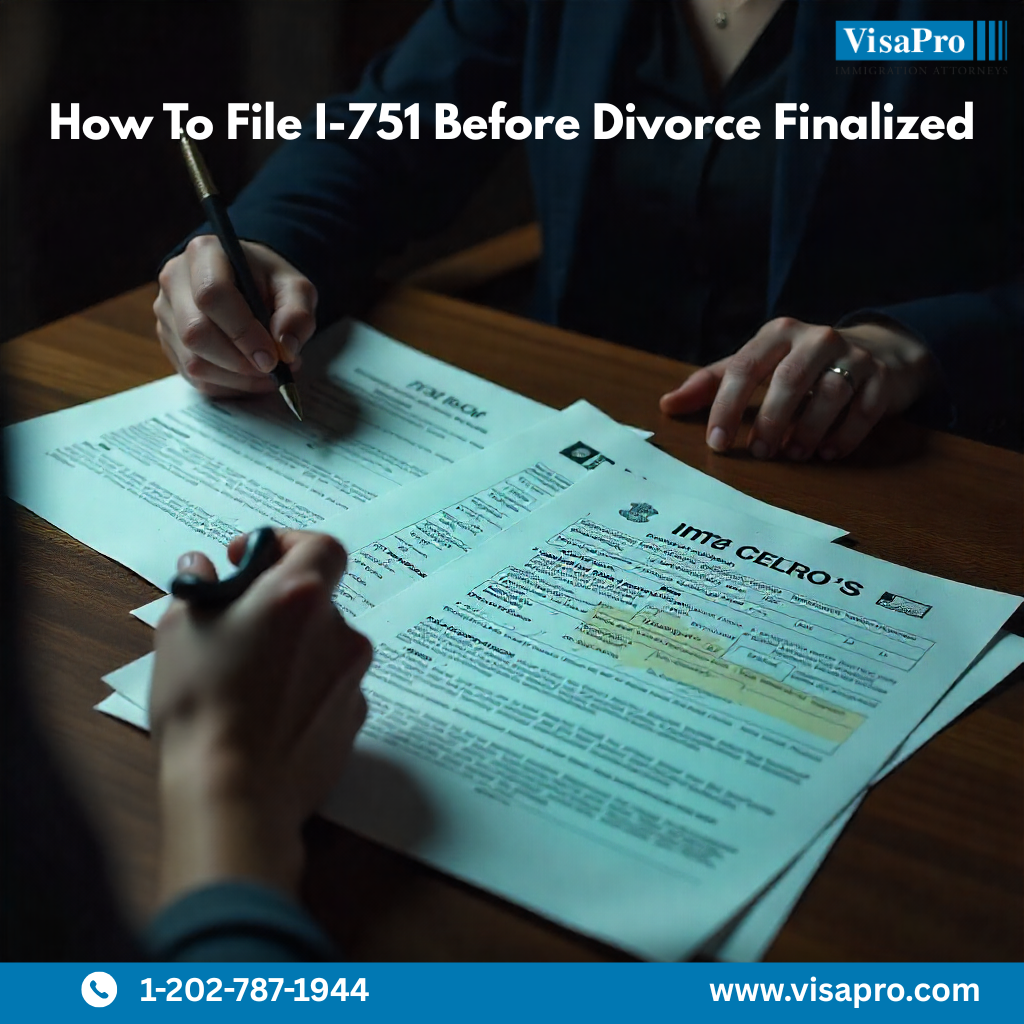Quick Summary:
If your marriage is ending but your divorce isn’t final before your conditional green card expires, you can still file an I-751 divorce waiver. USCIS allows this filing even with pending divorce proceedings. Let’s see how.
Understanding Your Options When Filing I-751 After Divorce Proceedings Begin
When you receive a two-year conditional green card through marriage, you are normally required to file a joint petition with your U.S. citizen spouse to remove conditions called the Form I-751, Petitions to Remove Conditions on Residence.
But when a marriage ends, this requirement creates anxiety. When your conditional green card is approaching its expiration date and your marriage has broken down, you face a critical decision point. The good news is that USCIS allows divorced conditional residents to file the Form I-751, Petition to Remove Conditions on Residence with a “waiver” of the joint filing requirement. The I-751 can be filed at any time before or after the conditional residence expires with the request for the waiver of the joint filing requirement.
Generally, when filing a request for the waiver, USCIS requires a copy of the final divorce decree or judgement.
The decision point arises if your conditional residence expiration is approaching and your divorce has been filed but is still pending. You can wait until the divorce is finalized and then file the Form I-751, but you risk USCIS terminating your residence before you get the chance to file the Form I-751, putting you at risk of removal from the U.S.
Recognizing that the dissolution of a marriage doesn’t always conclude within the tight timeline of the two-year conditional status period, USCIS allows applicants to file their I-751 petition to remove conditions on residence with a waiver of the joint filing requirement even if your divorce is still pending in court or if you have legally separated.
The key is acting promptly and understanding exactly what documentation you’ll need both initially and throughout the process. Many conditional residents mistakenly believe they must wait for their divorce to be finalized before filing, potentially missing their critical 90-day filing window.
The I-751 Divorce Waiver Process: What You Need to Know
Filing an I-751 divorce waiver after you have legally separated or have begun divorce or annulment proceedings follows a specific pathway that differs from the standard joint filing process. USCIS has created clear guidelines for this situation, recognizing the practical challenges involved.
When you file your I-751 petition, you’ll need to include evidence of your pending divorce/annulment proceedings or legal separation, such as court filings showing that dissolution proceedings have begun. You’ll still need to demonstrate that your marriage was entered into in good faith and not solely for immigration purposes.
USCIS will issue a Request for Evidence (RFE) asking for the final divorce or annulment decree. Generally, USCIS provides approximately 87 days to respond to the Request for Evidence. If your divorce or annulment has not been concluded in time to respond to the Request for Evidence, USCIS may deny your Form I-751.
Real-Life Example: Maria’s Experience
Maria received her conditional green card in March 2022 after marrying her U.S. citizen husband. By early 2024, their relationship had deteriorated, and they filed for divorce in February 2024. With her green card expiring in March 2024, Maria faced a dilemma.
Working with an experienced immigration attorney, Maria filed her I-751 with a request for a waiver of the joint filing requirement and evidence of her pending divorce before her conditional residence expired. She included her divorce filing papers and evidence of her good faith marriage. 1 year later, USCIS sent an RFE requesting her final divorce decree- her divorce had been finalized by this point. She provided the evidence to USCIS and her conditions were successfully removed.

Requirements for Removing Conditions on Green Card Through Waiver of the Joint Filing Requirement Due to Divorce or Annulment
The I-751 waiver of joint filing requirement has specific documentation and evidence requirements that you must satisfy to successfully remove the conditions on your green card. Understanding these requirements is crucial for building a strong case.
In addition to providing a final divorce or annulment decree, you must demonstrate that your marriage was entered into in good faith, meaning it was a genuine relationship and not arranged solely for immigration benefits. This requires substantial evidence of your shared life together, even though the marriage ultimately didn’t work out.
Evidence typically includes:
- birth certificate(s) of any child(ren) born to the marriage
- Evidence of joint responsibility of any step-child(ren)
- joint financial accounts (bank accounts, investment accounts, etc)
- shared leases or property ownership
- joint tax returns
- insurance policies and/or other documents listing each other as beneficiaries
- photographs together
- testimony or correspondence from friends and family who can attest to the genuine nature of your relationship. If your former spouse is willing, they can also provide a statement confirming the genuine nature of your relationship
- travel history as a couple.
Documentation Checklist for Pending Divorce Cases
If your divorce or annulment has not been finalized as of the date of filing, in lieu of the final divorce or annulment decree, you will need to provide:
- Copy of divorce petition filed in court and/or legal separation documentation
- Court stamped filing receipt showing case number and filing date if divorce has been filed
- Any temporary orders issued by the court (custody, support, property)
- Personal statement explaining the breakdown of the marriage
Common Mistake to Avoid:
Many applicants provide minimal evidence thinking that since they’re not filing together with their spouse, USCIS won’t scrutinize the validity of the original marriage. This is incorrect. In fact, because of the breakdown of the marriage, USCIS is going to look at your marriage very closely to determine if it was genuine from the beginning.
What Happens If You Divorce After Filing I-751 Jointly
An issue that has become increasingly common due to the long processing times for the Form I-751 is the breakdown of the marriage after filing. This creates a unique situation that requires immediate action to protect your immigration status.
If you filed jointly but file for divorce, separation or annulment after submission, the conditional resident must notify USCIS immediately of the change in circumstances. You’ll need to request that your case be converted to a waiver petition and provide documentation to support this change. If the divorce has already been finalized, USCIS will generally convert or amend the joint petition into a petition requesting a waiver.
If the divorce or annulment are pending, USCIS will send an RFE requesting final divorce documents. If the divorce or annulment have not been finalized, USCIS will not generally make a decision based on the filed documentation or schedule an interview. USCIS cannot deny the I-751 in this case solely based on the fact that a divorce or annulment has been filed.
The key is transparency and prompt notification. Failing to inform USCIS of a divorce or annulment after filing jointly will be viewed as misrepresentation, which can have serious immigration consequences.
Step-by-Step Action Plan:
- Notify USCIS immediately in writing of your change in marital status – preferably, they should be notified as soon as the legal separation, divorce or annulment is filed
- Request conversion of your case from joint filing to divorce waiver
- Submit additional evidence supporting the good faith nature of your original marriage
- Provide documentation of the separation, divorce or annulment proceedings
- Consider seeking legal representation given the complexity
I-751 Divorce Waiver Approved Without Interview: Can This Happen?
Absolutely! USCIS can approve a Form I-751 without an interview even when a marriage has been terminated through divorce or annulment.
While not guaranteed, this outcome is possible when your case is well-documented and straightforward.
USCIS typically approves cases without interviews when the evidence clearly demonstrates that the original marriage was genuine and that the divorce waiver criteria are met.
Cases most likely to be approved without interview include those with extensive joint financial records, shared property ownership, children together, and clear documentation of the marriage’s good faith nature from its inception.
However, you should always be prepared for the possibility of an interview, especially in waiver cases where USCIS may want to verify the circumstances of your marriage and its breakdown.
Factors That Support Approval Without Interview:
- Extensive joint financial documentation spanning the marriage duration
- Property ownership or long-term leases together
- Children born during the marriage
- Comprehensive evidence of shared social and family relationships
- Clear, consistent timeline of events
- Professional legal representation ensuring complete documentation
Real-Life Example: Miguel’s Experience
Miguel, a conditional resident from the Philippines, filed his Form I-751 requesting a waiver of the joint filing requirement. He was legally separated from his spouse at the time the petition was filed. He included a copy of the legal separation agreement filed with the court along with strong joint evidence (mortgage documents, joint tax returns, family photos and testimonial letters from friends and family who knew both Miguel and his spouse). He sent USCIS the divorce decree after they issued an RFE. His I-751 with divorce waiver request was approved without an interview shortly after receiving his RFE response.
Navigating the I-751 Interview
If USCIS schedules an interview for your I-751 divorce waiver, you’ll attend alone since you’re no longer married. This can feel intimidating, but understanding what to expect can help you prepare effectively.
The I-751 interview without spouse focuses on verifying the authenticity of your original marriage and understanding the circumstances that led to its breakdown. Officers are trained to approach these interviews with sensitivity while thoroughly examining your case.
At an I-751 waiver interview, officers focus on whether your marriage was genuine. Typical I-751 divorce waiver interview questions cover how you met, details about your relationship, living arrangements, and shared responsibilities.
Preparation Tips:
- Arrive early and dress professionally
- Review your evidence and timeline carefully
- Be consistent and truthful in your answers; Answer questions directly without volunteering unnecessary information
- Bring originals of all submitted documents
- Be prepared to explain the breakdown of your marriage without hostility
- Consider having your attorney present if permitted
Preparation is crucial for these interviews. Review all documentation you submitted, practice articulating your relationship timeline, and be ready to explain sensitive topics like domestic abuse or abandonment if they apply to your situation.
Common Challenges and How to Overcome Them
Do’s and Don’ts for Filing I-751 Divorce Waiver
Do’s:
- File before your card expires if at all possible
- Gather strong evidence of good faith marriage
- Respond to RFEs promptly
- Seek legal guidance if uncertain
Don’ts:
- Don’t ignore deadlines
- Don’t submit minimal evidence
- Don’t assume divorce alone guarantees approval
- Don’t face USCIS interviews unprepared
Overcoming Documentation Challenges:
- Request copies of joint financial records from banks and credit institutions
- Obtain property records from county recorder’s offices
- Collect medical records showing both spouses at appointments
- Gather children’s school records listing both parents
- Request employment records showing emergency contacts and beneficiary information
Divorce After I-751 Approval: What You Need to Know
Some couples successfully remove conditions on their green card, only to divorce afterward. Once your conditions are removed and you receive your 10-year green card, your immigration status is no longer dependent on your marriage. You can divorce without affecting your permanent residence, though this may impact future naturalization timing and requirements.
For naturalization purposes, if you divorce after I-751 approval, you’ll typically need to wait five years from your conditional green card issuance date rather than the three-year US citizen spouse-based naturalization timeline. This is an important consideration for long-term planning.
Your permanent residence remains valid regardless of subsequent marital changes, providing stability and security during what may be another difficult transition period.
Real life example: Tony’s experience
Tony filed the Form I-751 Joint Petition for Removal of Conditions on Residence with his spouse. While the Form I-751 was pending, his marriage began to deteriorate. Tony and his spouse, however, tried to work it out. In the meantime, the I-751 was approved. Unfortunately, shortly after Tony obtained his green card, his spouse filed for divorce. Tony doesn’t have to fear losing his green card as the divorce occurred after his I-751 was approved.
Taking the Next Step: Professional Guidance for Your I-751 Case
Filing an I-751 divorce waiver while your divorce is pending involves complex legal and procedural requirements that benefit significantly from professional guidance. An experienced immigration attorney can help you navigate both the immediate filing requirements and long-term implications.
Professional assistance is particularly valuable in divorce waiver cases because they require careful coordination between immigration and family law proceedings, extensive evidence compilation, and strategic presentation of your case to USCIS.
At VisaPro, our experienced immigration attorneys understand the emotional and legal complexities of I-751 divorce waivers. We provide comprehensive support from initial case assessment through final approval, ensuring your rights are protected throughout the process.
Don’t navigate this challenging process alone. The stakes are too high, and the requirements too complex to risk mistakes that could jeopardize your permanent residence. Contact VisaPro today for a free consultation to discuss your specific situation and develop a winning strategy for your I-751 divorce waiver case.
Frequently Asked Questions (FAQ)
1.Can I file an I-751 divorce waiver if my divorce isn’t final yet?
Yes, you can file an I-751 divorce waiver even if your divorce proceedings are still pending. USCIS allows this filing and will typically request final divorce documentation through an RFE later in the process.
2.What happens if I divorce after filing I-751 jointly with my spouse?
If you begin divorce or annulment proceedings after filing I-751 jointly, you must immediately notify USCIS of the change in circumstances and request conversion of your case to a divorce waiver petition. Prompt notification and additional documentation will be required.
3.What are the main requirements for removing conditions on green card through divorce waiver?
The main requirements include proving your marriage was entered into in good faith (not for immigration purposes), providing evidence of pending or completed divorce proceedings, and demonstrating that you meet the criteria for waiver of joint filing requirement.
4.Can I attend my I-751 interview without my spouse if we’re divorcing?
Yes, you can and must attend your I-751 interview without your spouse when filing a divorce waiver. The interview will focus on verifying the authenticity of your original marriage and understanding the circumstances of its breakdown.
5.Will the conditions on my permanent residence be automatically removed if I have children with my U.S. citizen spouse?
Having children with your U.S. citizen spouse significantly strengthens your I-751 divorce waiver case as evidence of good faith marriage, but it doesn’t guarantee automatic approval. You still must provide comprehensive documentation and meet all filing requirements.
6.What I-751 divorce waiver interview questions should I expect?
Common I-751 divorce waiver interview questions include details about how you met, your wedding and marriage, living arrangements, financial arrangements, when problems began, attempts to save the marriage, and current divorce proceedings status.
7.Can I petition to remove conditions on residence if my spouse abandons me?
Yes, you can petition to remove conditions on residence based on spouse abandonment, which falls under the extreme hardship waiver category. This requires different documentation than a standard divorce waiver and may involve additional evidence of the abandonment circumstances.
Reviewed By Immigration Attorney
Ancy S. Varghese is a U.S. immigration attorney with 19 years of experience at VisaPro Immigration Law Firm, specializing in family- and marriage-based immigration. She has extensive expertise guiding conditional residents through complex I-751 filings, including divorce waivers, extreme hardship waivers, and cases involving pending divorces or legal separations. Ancy helps clients compile comprehensive evidence of good faith marriages, navigate USCIS procedural requirements, respond to Requests for Evidence, and secure removal of conditions on green cards even under challenging circumstances.
Don’t navigate this challenging process alone. The stakes are too high, and the requirements too complex to risk mistakes that could jeopardize your permanent residence. Contact VisaPro today for a free consultation to discuss your specific situation and develop a winning strategy for your I-751 divorce waiver case.
What VisaPro Customers Are Saying
The US [B-1] Visa has always been a tough ride, and being denied a few times it makes it even worse. But thanks to VisaPro and their meticulous processing I was granted a Visa. I would like to thank you and all the people involved in making this a success. I would like to recommend VisaPro to all those who seek peace of mind and hassle free Visa processing.”




 Manas Bhat, Director Operations, First Houston Mortgage India
Manas Bhat, Director Operations, First Houston Mortgage India


